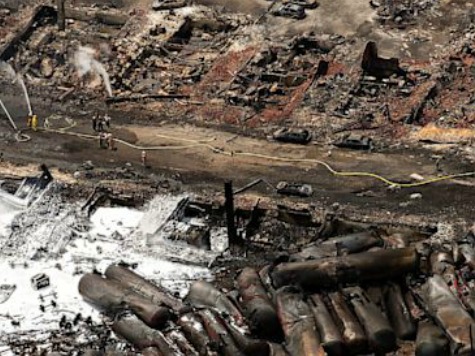
The Canadian Royal Mounties believe that the mile-long runaway oil train that killed 20 people and left 30 missing in a small Quebec town may have been an act of criminal negligence for failing to set the brakes properly.
But the real criminal negligence is that oil from hydraulic fracking operations in booming North Dakota must be shipped by trains over a thousand miles to refiners in Nova Scotia. This occurs because regulators fought building American pipelines and refineries to protect and subsidize railroads, such as Burlington Northern Railway Company.
Every day, an average of ten trains with up to 100 tank-cars leave North Dakota carrying 3.35 million gallons of raw crude oil to journey over a thousand miles to refineries in Nova Scotia and Texas. Railroads carry 75 percent of North Dakota oil and are the prime reason oil hauled by U.S. tank cars rose over the last three years by 2,000 percent to a total of 6.5 billion gallons. Railroads claimed to average only thirteen spills per year for the last ten years, but 60 percent of oil shipments by rail occurred in the last two years.
Railroads are designed to go to people, whereas pipelines carry toxic products and go to refineries that are specifically located a safe distance away from populated areas. Some media stories have repeated public relations statements from the oil industry that they prefer a mix of pipeline and rail transport of crude oil. Only good fortune prevented a Lac-Megantic level disaster from occurring sooner; imagine if a hundred tank cars exploded at a refinery.
Canadian Prime Minister Stephen Harper described the aftermath of the Lac-Megantic disaster as a “war zone.” Air brakes holding it in place likely failed, allowing the train, which normally creeps downhill at 15 miles per hour, to accelerate to 63 miles an hour and vaporize the town when it crashed and exploded.
Every month since March there has been a serious Canadian oil train derailment. Last month, four Canadian Pacific (CP) rail cars carrying flammable petrochemicals used to dilute oil derailed on a flood-damaged bridge spanning Calgary’s Bow River.
In May, five tankers containing oil on another CP train derailed in rural Saskatchewan spilling 575 barrels of crude, the Toronto Sun reported. In April, 22 CP rail cars jumped the tracks near White River, Ontario and leaked 17,000 gallons of crude. In March, 14 cars on a mile-long train derailed, and spilled 14,000 gallons of crude near Minneapolis.
The fallout from the derailment is already having a negative impact on the near-term growth of moving petroleum by freight trains, which was on trend to double this year from 2012. Moody’s credit rating service warned: “The Quebec derailment — likely North America’s worst rail accident since 1918 — will inevitably lead to increased US and Canadian government scrutiny and permitting delays, along with higher costs for shippers,” said the credit rating agency.
Moody’s revised its ratings to “credit negative” for North American railways, which have relied on the boon in moving crude by rail to offset declines in coal shipments.
In 1970 America had 315 refineries sprinkled across the nation and the U.S. imported 67 million gallons of crude oil per day, but by 2006 environmental restrictions had shrunk America’s number of refineries to 105 and we were importing 449 million gallons per day. In percentage terms of U.S. supply, imports grew from 20 percent to 65 percent. In 2006, almost a third of U.S. total supply of oil was imported from the unstable Persian Gulf.
Since 2007, the drilling process known as hydraulic fracking has made commercially profitable petroleum deposits that were historically too costly to exploit. North Dakota production has grown from about 8.25 million gallons a day to 43.45 million gallons today. The Sierra Club’s Wayde Schafersaid that U.S. oil and gas production peaked in the 1980s and was in terminal decline: “The oil development has happened so rapidly, it’s ahead of the infrastructure to deal with it.”
Pipelines are the safest and most cost-effective transportable crude oil. Legislative veto of projects like the Keystone XL pipeline pushed oil onto to the more risky rails. Rapidly expanding shale oil production is making American “energy independence” feasible. I believe Congress and the Administration now know they are criminally negligent if they do not ensure public safety by green-lighting $5 trillion in new pipelines and refineries.

COMMENTS
Please let us know if you're having issues with commenting.